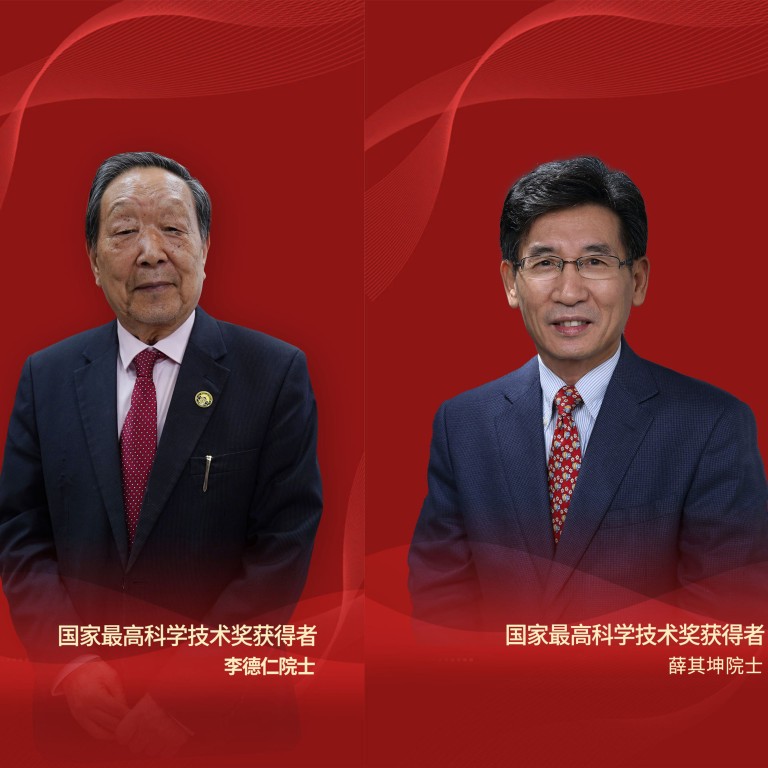
China’s Xi calls to ‘seize high ground’ as satellite-image expert and quantum physicist take top science prize
- Geospatial expert Li Deren and quantum physicist Xue Qikun have received China’s most prestigious State Pre-eminent Science and Technology Award
Li Deren, a noted geospatial expert and professor at Wuhan University, and physicist Xue Qikun, president of the Southern University of Science and Technology in Shenzhen, trained for research degrees in Germany and Japan, respectively.
Chinese President Xi Jinping presented the pair with the State Pre-eminent Science and Technology Award at the Great Hall of the People in Beijing on Monday.
In a speech to mark the occasion, Xi underlined the need for a greater sense of urgency in pushing forward sci-tech innovation so that China can “seize the high ground”.
“There are still some shortcomings [and] weaknesses,” Xi said, calling to boost “national strategic scientific and technological forces” to support “basic research while encouraging free exploration”.
Li, 85, received the accolade “for his expert knowledge of the core technologies of high-precision global positioning and mapping via satellite remote-sensing”, according to Chinese state news agency Xinhua.
One of Li’s major achievements was the design of ZY-3, China’s first civilian high-resolution mapping satellite, which produced 1:50,000 orthophotos. An orthophoto is an aerial image in which distortions caused by terrain relief and camera tilt have been removed so that it can be read the same way as a map.
Xue was honoured for “opening up a new direction of research in high-temperature superconductivity”, Xinhua said. The 61-year-old is a world-leading researcher in condensed matter physics, in particular topological insulators, a type of material that exists in a recently discovered state of quantum matter.
Because its interior insulates while its surface conducts electricity without heat loss, a topological insulator is ideal for the efficient electronics of the future. In 2013, Xue’s team was the first to report an experimental observation of topological insulation, beating competitors in Japan, Germany and the United States.
The honour received by Li and Xue was part of China’s annual National Science and Technology Awards. It has four other categories: for natural science, technological invention, scientific and technological progress and international science and technology cooperation.
The State Pre-eminent Science and Technology Award is most prized among the five, with no more than two winners recognised for outstanding achievements and great contributions to society. Each receives 5 million yuan (about US$700,000) in prize money.
Tu Youyou, a co-winner of the 2015 Nobel Prize in Physiology or Medicine, and agronomist Yuan Longping, known as the “father of hybrid rice”, are previous recipients of the top prize.
Li graduated in 1963 from the Wuhan Institute of Surveying and Mapping, which later became the School of Geodesy and Geomatics at Wuhan University. After later earning a master’s degree, he headed to Germany for further studies in 1982 and started his PhD in 1983 at the University of Stuttgart. Two years later and armed with a doctorate, he returned to China.
In 2022, Li became the first Chinese scientist to receive the Brock Gold Medal. Established in 1952 by the American Society for Photogrammetry and Remote Sensing, the Brock Gold Medal is one of the most influential awards in the community and is presented to one scientist every four years.
For Xue, born to a rural family in Shandong province, life as a student was full of setbacks in the early days. He failed the graduate entrance exam twice before being admitted to the Institute of Physics at the Chinese Academy of Sciences (CAS) in 1987.
His PhD was a joint Chinese-Japanese programme and, while studying in Japan at Tohoku University, he had to learn Japanese while working 16 hours a day, six days a week in the lab.
“It was really challenging, but I managed to complete a very important experiment the following year, which became a turning point in my career,” Xue told Chinese state broadcaster CCTV in 2018.
After working as a research associate at Tohoku University for five years, including one year as a visiting scholar at North Carolina State University in the US, Xue returned to China in 1999 and joined the Institute of Physics, CAS. He has been a distinguished professor at Tsinghua University since 2005.
The other National Science and Technology Awards were also announced today, with a total of 250 projects among the prizewinners.
The first prize in the State Natural Science Award category also went to topological research. A group of physicists at CAS won the top prize for innovations in calculating and predicting the topological properties of materials, an advance that could make the search for such materials much easier.
Eight projects took first prize in the State Technological Invention Award. These included one related to a key technology in the semiconductor industry – a chemical-mechanical polishing (CMP) machine for integrated circuits developed by a team from Tsinghua University.
Another winner in the category was an invention to prevent and control groundwater pollution in the Beijing-Tianjin-Hebei area.
The progress award also recognises technological advances in areas such as energy, communications and the environment, including the development of offshore wind power and a high-performance membrane for lithium-ion batteries.


